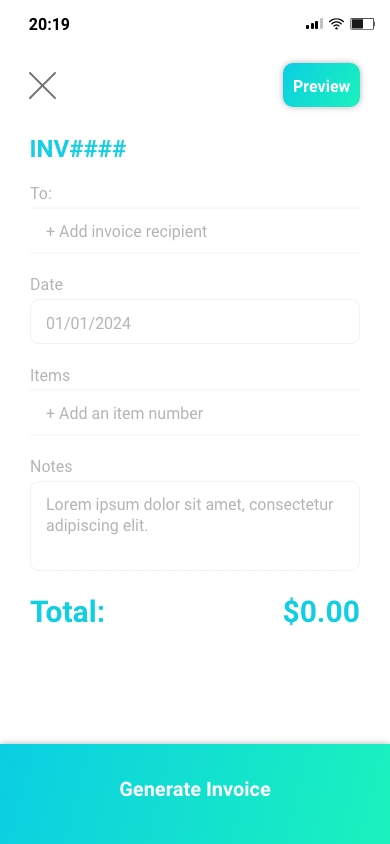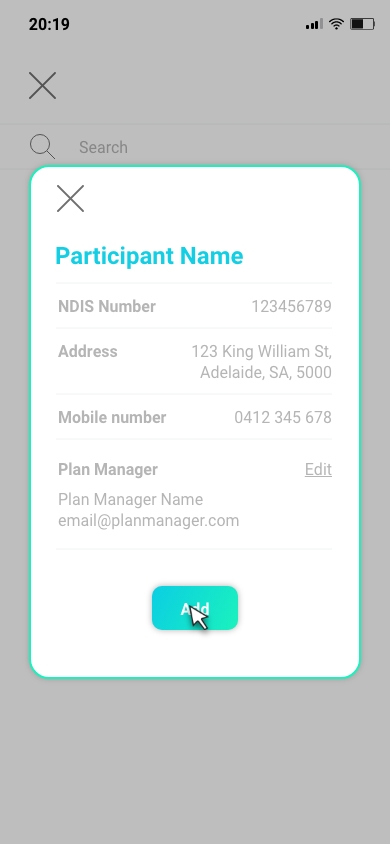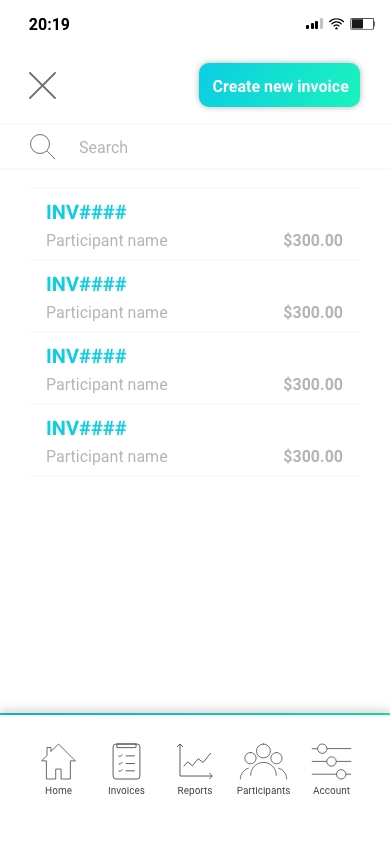
Invoicing Guidelines
This information is provided by EasyAs for some invoicing guidance and how to use our platform.
EasyAs is an invoicing platform only and each provider must do their own due diligence and research into the invoices they are submitting to their participants to ensure they are accurate and that only supports being provided are allowed to be claimed.
NDIS General Invoicing Principles
The best place to refer to for invoicing rules and guidelines is the NDIS Pricing Arrangements publication which is available here https://www.ndis.gov.au/providers/pricing-arrangements
This publication provides all the information a NDIS provider requires to determine hourly rates for each NDIS item number and which types of support claims (travel, travel kms, non-face-to-face, report writing, short notice cancellation and telehealth) can be invoiced for each item number.
One of the key benefits of EasyAs is that the platform has already been developed with these support types identified for each NDIS Item Number. Meaning as a NDIS provider you can trust EasyAs to only allow you the ability to invoice only the correct supports.
The NDIS published hourly rates are the maximum that can be invoiced for plan managed participants, although participants and providers can negotiate lower rates.
The NDIS regularly update the NDIS Pricing Arrangements document. An important benefit of using EasyAs is that the platform takes care of all the hourly rates for you. Based on your date of support, the EasyAs app will select the correct NDIS hourly rate.
Self-managed participants are not subject to the price limits or other pricing arrangements. NDIS providers are able to negotiate hourly rates with self-managed participants.
Always remember when supporting more than one participant at a time that all of the NDIS rates provided must be split over the number of participants. For example, if you are supporting two participants at the same time for a community access visit on the weekday, the NDIS hourly rate $67.56 needs to be invoiced at 2 / $67.56 per hour = $33.78 per participant. You will need to manually adjust the hourly rates in EasyAs when invoicing for shared supports.
How to Create an Invoice
EasyAs App is designed to start invoicing by firstly selecting the category of supports being provided to your participants.
Once this is selected you will be presented with the invoicing options and NDIS item numbers and hourly rates applicable to only that support category.
Additional categories of support can be included on each invoice, you aren’t limited to just one support type on each invoice – for example you can include both Daily Supports and Accessing Social & Community Supports on one invoice. Once you have completed invoicing for one type of category, you can then select the next support category and the appropriate item numbers and hourly rates will be displayed.
You’ll need to create a separate entry for each date of support for your participant.
Firstly, enter all the support hours and types of support for your first support date, then select to add your next support type / date.
EasyAs has been created this way for providers, so all the hours of support are transparent and aren’t combined over date ranges. When dates are combined into date ranges on your invoices is makes it difficult for the participant, their plan nominee and support coordinator to see how many hours you have invoiced for each date.
Tips to make invoicing quicker
Use EasyAs to select the ‘heart’ next to the participants you support the most frequently, that way they will come up at the top of your participant list.
Use EasyAs to make your invoicing easier by selecting the ‘heart’ next to the category and item numbers you use the most frequently. That way these will be at the top of your support list so you don’t have to scroll through the list of item numbers in each category.
Use the search feature to look for your supports, for example ‘weekday’, ‘Saturday’, ‘social’.
Description of Supports as per EasyAs App Invoicing Categories
As a provider you must check with your participant / plan nominee or support coordinator to confirm what area of plan funding you should be invoicing from. Not all NDIS participants have all the various support categories in their NDIS plan.
Daily Supports – In Home / Self-Care
- Personal care: help with showering, toileting, grooming and dressing
- Supports provided in-home by support workers to assist a participant with their daily tasks
- Meal preparation: help with planning, preparing and cooking (this doesn’t include meal preparation & delivery by a NDIS meal provider, this needs approval by the NDIS and needs to be included in the participants plan funding)
- Includes over-night sleepover supports
Daily Supports – Household Supports
- Essential household tasks to assist a participant to maintain their home
- House & yard maintenance
- House cleaning
- Assistance with cost of preparation and delivery of meals (the NDIS participant must have approved funding in their NDIS plan to invoice for this support and this support doesn’t cover the cost of the food itself)
- Linen Service (this is a Stated NDIS Support, meaning that funding must be specifically stated and the amount approved in the NDIS plan)
Daily Supports – SIL / Home & Living
The support item numbers in this funding area are for NDIS participants who have SIL / Home & Living funding approved in their NDIS plan. If SIL / Home & Living funding isn’t mentioned in the NDIS plan, then it would be best to invoice using the Daily Supports – In Home / Self Care support item numbers.
Individualised Living Options (ILO) – this item number is for supports to explore and design an ILO living arrangement for a NDIS participant and is generally only used by support coordinators who are assisting participants in this area.
Item numbers are included in this category for NDIS participants who are specifically funded for Intensive and Complex Behaviour Supports and are living in a Group or Shared Living Arrangement.
Daily Supports – STA / Respite
Item numbers in this support range are for providers invoicing for STA / respite supports, please take care to use the correct item number based on the number of participants being supports. There are different item numbers for support ratios, for example 1:1 direct support or 1:2, 1:3 and 1:4 support ratios.
Please also take care to adjust the STA rate if you haven’t provided a full 24-hour day of STA support. The rate in the NDIS Pricing Arrangements for STA/Respite is for a full 24-hour period, you will need to adjust this amount manually in EasyAs if you have provided less than 24-hours. The lower rate can be negotiated with your participant, plan nominee or support coordinator.
Item numbers in this support range also include ‘Assistance with Self-Care Activities in a STA’, please note these item numbers are generally only used when a NDIS participant needs a short period of additional 1:1 support for self-care while on STA / respite. The NDIS would only allow use of these item numbers for highly complex participants who need additional supports while in STA / respite.
Daily Supports – Nursing
Here you will find all the NDIS Core support item numbers for Nursing supports – these item numbers cover Enrolled Nurse, Registered Nurse, Clinical Nurse, Clinical Nurse Consultant and Nurse Practitioner NDIS item numbers and rates.
The NDIS item number selected will depend on your nursing qualification and registration.
Daily Supports – Other
- Specialised Home-Based Assistance for a Child
- Assistance item numbers when participant is living in a group of shared living arrangement
- Capacity Building and Training in Self-Management
Social & Community – Standard
These supports are invoiced when you are supporting your NDIS participant outside of the home.
Some examples include medical appointments, shopping, assistance to attend activities or events (please note that the NDIS doesn’t cover the cost of any of the activity or event costs, these must be paid by the participant themselves) and visiting family & friends.
Assistance to access hobbies and recreation activities like bike riding, going for a walk, attending the gym (please note the NDIS only pays for the support worker and not the activity costs).
Social & Community – Group & Centre Based Activities
These item numbers are for NDIS providers who arrange community and group activities provided in a group setting – either in the community or in a centre.
This category also includes invoicing for Centre Capital Costs where supports are delivered in centres and is an additional amount to contribute to the costs of running and maintaining a centre. Where appropriate, they can be claimed per hour per participant.
Social & Community – High Intensity / Intensive & Complex
Please note the NDIS only allow the item numbers in this support type to be invoiced if the NDIS participant is specifically funded for high intensity / intensive or complex supports.
Using these item numbers without the funding be written in the NDIS participants plan may result in the NDIS Plan Manager returning your invoice for correction and / or explanation.
Social – Employment Supports
NDIS item numbers for on-the-job employment supports which can be provided in any workplace.
The NDIS Pricing Arrangements price limits are for 1:1 supports, as with all other NDIS item numbers if employment supports are being provided to a group the hourly rate needs to be apportioned for each participant’s invoice.
Support Coordination
Providers may only invoice for support coordination if funding is specifically provided for this function in the support coordination funding area of the NDIS participants plan.
This funding area is used by both support coordinators and psychosocial recovery coaches and providers must use the appropriate item number for the support that applies to the participants plan funding.
Finding & Keeping A Job
This funding area includes School Leaver Employment Supports, support coordination (in relation to supports for employment only), employment assessment and counselling, on-the-job employment supports.
Behaviour Supports
This funding can only be used by Behaviour Support Practitioners who have been approved and registered by the NDIS to provider Behaviour Supports.
This support category is for specialised behaviour assessments where a participant may have unclear or complex needs, and the NDIS has approved a Behaviour Management Plan to be completed to address behaviours of concern.
Improved Health & Wellbeing
Some NDIS participants may have been approved for funds to improve their health and wellbeing to maintain or improve their physical mobility through personal training or exercise physiology. Funding may also have been included to assist a NDIS participant to manage their diet for health and wellbeing where this can have an impact on their disability.
The types of support found in this funding area are exercise physiology, dietetic supports and personal training.
Therapy Supports (up to the age of 7 years)
These NDIS support item numbers are for use for participants up to their 7th birthday, once they turn 7 years of age then the support item numbers Therapy Supports (over 7 years of age) needs to be used for invoicing.
Please refer to the NDIS Pricing Arrangements here https://www.ndis.gov.au/providers/pricing-arrangements for the qualifications and allied health therapy bodies that therapists are required to be registered with to find the appropriate NDIS item number for invoicing.
If the invoice is for Therapy Assistant supports, the therapy assistant must operate under the delegation, supervision and insurance of the overseeing therapist).
Therapy Supports (over the age of 7 years)
These NDIS support item numbers are for use for participants from their 7th birthday onwards. If the participant is under the age of 7 years, then the Therapy Support (up to the age of 7 years) NDIS item numbers need to be used.
Please refer to the NDIS Pricing Arrangements here: https://www.ndis.gov.au/providers/pricing-arrangements for the qualifications and allied health therapy bodies that therapists are required to be registered with to find the appropriate NDIS item number for invoicing.
If the invoice is for Therapy Assistant supports, the therapy assistant must operate under delegation, supervision and insurance of the overseeing therapist).
Therapy Supports (Nursing)
Here you will find all the NDIS therapy support item numbers for Nursing supports – these item numbers cover Enrolled Nurse, Registered Nurse, Clinical Nurse, Clinical Nurse Consultant and Nurse Practitioner NDIS item numbers and rates.
The NDIS item number selected will depend on your nursing qualification and registration.
Therapy Supports (Other)
In the EasyAs Invoicing app, the Other therapy supports category includes the following:
- Assistive Technology Mentoring
- Assistance with Decision Making, Planning & Budgeting
- Skill Development & Training
- Training for Parents / Carers
- Hearing Services by an Audiologist or Audiometrist
- Specialised Driving Training (this is a restricted NDIS item number and Stated & NDIS Approved funds must be included in a participants NDIS plan to use this item number)
- Selection and / or Manufacture of Customised or Wearable Technology
Other NDIS Support Types
Other types of NDIS support can only be claimed if the NDIS Pricing Arrangements allows.
EasyAs will guide you with this and the other support types will be listed under each NDIS Item Number being invoiced.
Non-Face-to-Face Supports (NF2F)
These are supports that are provided remotely and when not in direct contact with the participant. For example: notetaking, video calls, phone calls, messaging and emails.
The supports must be specifically provided to the participant being invoiced and can include guidance and advice, planning and coordination or services and notetaking.
Non-face-to-face can’t be used to invoice for invoicing NDIS claims, training and supervising staff, service agreement negotiation or rostering and administrative tasks – the cost for these are already built in the NDIS hourly rate.
Travel Time (TRAN)
Provider travel time claims must be invoiced separately to the claim for the primary support hours and use the same NDIS item number as the primary support item number. This is built into EasyAs to make invoicing simpler for providers.
In general, the maximum amount of provider Travel Time that can be invoiced is 30 minutes to a participant support shift and then 30 minutes on the return trip back to the providers usual place of work – this is only when the participant is the last shift for the day.
If a participant lives regionally / remotely the amount of travel time can be up to 60 minutes each way and the provider will need to refer to the NDIS Pricing Arrangements for the eligible remote / regional locations.
As always, the provider must discuss invoicing travel time with their participant and have agreement on rates and claiming.
Short Notice Cancellations (CANC)
This is an area of invoicing that the provider will need to undertake some due diligence themselves before invoicing under this category to ensure they are compliant with their invoicing. Some general information is provided below.
A provider can claim up to 100% of the agreed shift if this is agreed in the signed service agreement and the following conditions are met:
- Short Notice Cancellation – 2 clear business days
This typically applies to non-Disability Support Workers where a participant cancels with less than 2-clear business days’ notice or a participant didn’t show up for the scheduled support.
The provider was unable to find alternative billable work for the support shift. - Short Notice Cancellations – 7 days
This typically applies only to Disability Support Workers where a participant cancels or doesn’t show up for supports with 7-days’ notice and the provider was unable to find alternative billable work for the support shift.
Report Writing (REPW)
Providers can invoice for report writing from a participants plan if both the following conditions are met:
- The provider has the agreement of the participant in a signed service agreement.
- The report is required by the NDIS to measure functional outcomes against plan goals or that makes recommendations for ongoing support needs.
Telehealth (THLT)
Telehealth can be used to deliver supports to participants where delivery by this method is appropriate and are specific to the participant and a service agreement is in place.
NDIS providers delivering telehealth supports need to ensure that the same standard of care is provided as in a clinical setting.
Travel Kms (Provider Travel: Non-Labour Costs)
A provider can invoice for travel kms when travelling to a participant to delivery face to face supports and when the NDIS Item Number being used for invoicing allows for travel kms to be invoiced.
Activity Based Transport – Travel Kms
This item number can only be used when invoicing for Access Social & Community Supports. EasyAs will only allow you to use this item number when invoicing using an item number from the social and community funding area.
The purpose of these item numbers is for claiming travel kms when the participant is in the providers vehicle and travelling to access social & community participation supports.


